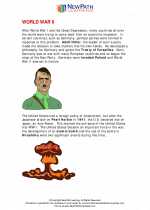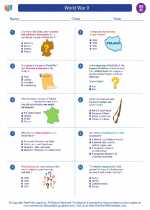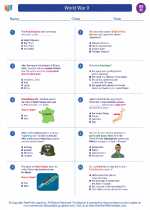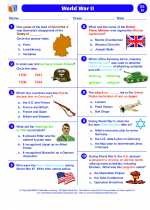World War II
After World War I and the Great Depression, many countries all over the world were trying to come back from an economic recession. Adolf Hitler, the leader of a party developed a philosophy for Germany and ignore the Treaty of Versailles. Soon, Germany was at war with many European countries and so began the reign of the Nazi Party. Germany soon invaded Poland and World War II was set in motion. Read More...
◂Social Studies Worksheets and Study Guides Eighth Grade. World War II
Study Guide World War II
World War II  Worksheet/Answer key
Worksheet/Answer key World War II
World War II  Worksheet/Answer key
Worksheet/Answer key World War II
World War II  Worksheet/Answer key
Worksheet/Answer key World War II
World War II  Worksheet/Answer key
Worksheet/Answer key World War II
World War II 

 Worksheet/Answer key
Worksheet/Answer key
 Worksheet/Answer key
Worksheet/Answer key
 Worksheet/Answer key
Worksheet/Answer key
 Worksheet/Answer key
Worksheet/Answer key

The resources above cover the following skills:
National Curriculum Standards for Social Studies (NCSS)
TIME, CONTINUITY, AND CHANGE
SOCIAL STUDIES PROGRAMS SHOULD INCLUDE EXPERIENCES THAT PROVIDE FOR THE STUDY OF THE PAST AND ITS LEGACY.
KNOWLEDGE - Learners will understand:
The study of the past provides a representation of the history of communities, nations, and the world.
Concepts such as: chronology, causality, change, conflict, complexity, multiple perspectives, primary and secondary sources, and cause and effect.
That learning about the past requires the interpretation of sources, and that using varied sources provides the potential for a more balanced interpretive record of the past.
That historical interpretations of the same event may differ on the basis of such factors as conflicting evidence from varied sources, national or cultural perspectives, and the point of view of the researcher.
Key historical periods and patterns of change within and across cultures (e.g., the rise and fall of ancient civilizations, the development of technology, the rise of modern nation-states, and the establishment and breakdown of colonial systems).
The contributions of key persons, groups, and events from the past and their influence on the present.
The influences of social, geographic, economic, and cultural factors an the history of local areas, states, nations, and the world.
PEOPLE, PLACES, AND ENVIRONMENTS
SOCIAL STUDIES PROGRAMS SHOULD INCLUDE EXPERIENCES THAT PROVIDE FOR THE STUDY OF PEOPLE, PLACES, AND ENVIRONMENTS.
KNOWLEDGE - Learners will understand:
Factors that contribute to cooperation and conflict among peoples of the nation and world, including language, religion, and political beliefs.
INDIVIDUALS, GROUPS, AND INSTITUTIONS
SOCIAL STUDIES PROGRAMS SHOULD INCLUDE EXPERIENCES THAT PROVIDE FOR THE STUDY OF INTERACTIONS AMONG INDIVIDUALS, GROUPS, AND INSTITUTIONS.
KNOWLEDGE - Learners will understand:
That when two or more groups with differing norms and beliefs interact, accommodation or conflict may result.
PROCESSES - Learners will be able to:
Analyze the effects of interactions between and among individuals, groups, and institutions.
Identify and analyze the impact of tensions between and among individuals, groups, and institutions.
POWER, AUTHORITY, AND GOVERNANCE
SOCIAL STUDIES PROGRAMS SHOULD INCLUDE EXPERIENCES THAT PROVIDE FOR THE STUDY OF HOW PEOPLE CREATE, INTERACT WITH, AND CHANGE STRUCTURES OF POWER, AUTHORITY, AND GOVERNANCE.
PROCESSES - Learners will be able to:
Analyze and evaluate conditions, actions, and motivations that contribute to conflict and cooperation among groups and nations.
Evaluate the role of technology as it contributes to conflict and cooperation among nations and groups, and as it contributes to or detracts from systems of power, authority, and governance.
GLOBAL CONNECTIONS
SOCIAL STUDIES PROGRAMS SHOULD INCLUDE EXPERIENCES THAT PROVIDE FOR THE STUDY OF GLOBAL CONNECTIONS AND INTERDEPENDENCE.
PROCESSES - Learners will be able to:
Analyze examples of conflict, cooperation, and interdependence among groups, com-munities, regions, societies, and nations.
Describe and explain the relationships and tensions between national sovereignty and global interests in such matters as territorial rights, natural resources, trade, the different uses of technology, and the welfare of people.
National Standards for Civics and Government (NSCG)
What are the foundations of the American political system? What is American political culture?
The character of American political conflict. Students should be able to describe the character of American political conflict and explain factors that usually prevent violence or that lower its intensity. To achieve this standard, students should be able to
Describe political conflict in the United States both historically and at present, such as conflict about
Engaging in wars
How does the government established by the constitution embody the purposes, values, and principles of American democracy? What does the national government do?
Major responsibilities for domestic and foreign policy. Students should be able to explain the major responsibilities of the national government for domestic and foreign policy. To achieve this standard, students should be able to
Identify historical and contemporary examples of important foreign policies, e.g., Monroe Doctrine, Marshall Plan, immigration acts, foreign aid, arms control, promoting democracy and human rights throughout the world
What is the relationship of the United States to other nations and to world affairs? How is the world organized politically?
Interaction among nation-states. Students should be able to explain how nation-states interact with each other. To achieve this standard, students should be able to
Describe the most important means nation-states use to interact with one another
Military force and the threat of force
Explain reasons for the breakdown of order among nation-states, e.g., conflicts about national interests, ethnicity, and religion; competition for resources and territory; absence of effective means to enforce international law
Explain the consequences of the breakdown of order among nation-states
United States' relations with other nation-states. Students should be able to explain how United States foreign policy is made and the means by which it is carried out. To achieve this standard, students should be able to
Describe various means used to attain the ends of United States foreign policy, e.g., diplomacy; economic, military, and humanitarian aid; treaties; trade agreements; incentives; sanctions; military intervention; covert action
National Center for History in Schools (NCHS)
Historical Thinking Standards
Chronological Thinking
Identify the temporal structure of a historical narrative or story.
Reconstruct patterns of historical succession and duration; explain historical continuity and change.
Historical Comprehension
Reconstruct the literal meaning of a historical passage.
Identify the central question(s) the historical narrative addresses.
Historical Analysis and Interpretation
Analyze cause-and-effect relationships and multiple causation, including the importance of the individual, the influence of ideas.
Draw comparisons across eras and regions in order to define enduring issues.
Challenge arguments of historical inevitability.
Hold interpretations of history as tentative.
Historical Research Capabilities
Formulate historical questions.
Historical Issues-Analysis and Decision-Making
Identify issues and problems in the past.
Identify relevant historical antecedents.
United States History Content Standards
Era 7: The Emergence of Modern America (1890-1930)
How the United States changed from the end of World War I to the eve of the Great Depression.
The student understands politics and international affairs in the 1920s.
Era 8: The Great Depression and World War II (1929-1945)
The causes and course of World War II, the character of the war at home and abroad, and its reshaping of the U.S. role in world affairs.
The student understands the international background of World War II.
The student understands World War II and how the Allies prevailed.
World History Content Standards
Era 8: A Half-Century of Crisis and Achievement, 1900-1945
The search for peace and stability in the 1920s and 1930s.
The student understands postwar efforts to achieve lasting peace and social and economic recovery.
The causes and global consequences of World War II.
The student understands the causes of World War II.
The student understands the global scope, outcome, and human costs of the war.
Major global trends from 1900 to the end of World War II.
The student understands major global trends from 1900 to the end of World War II.